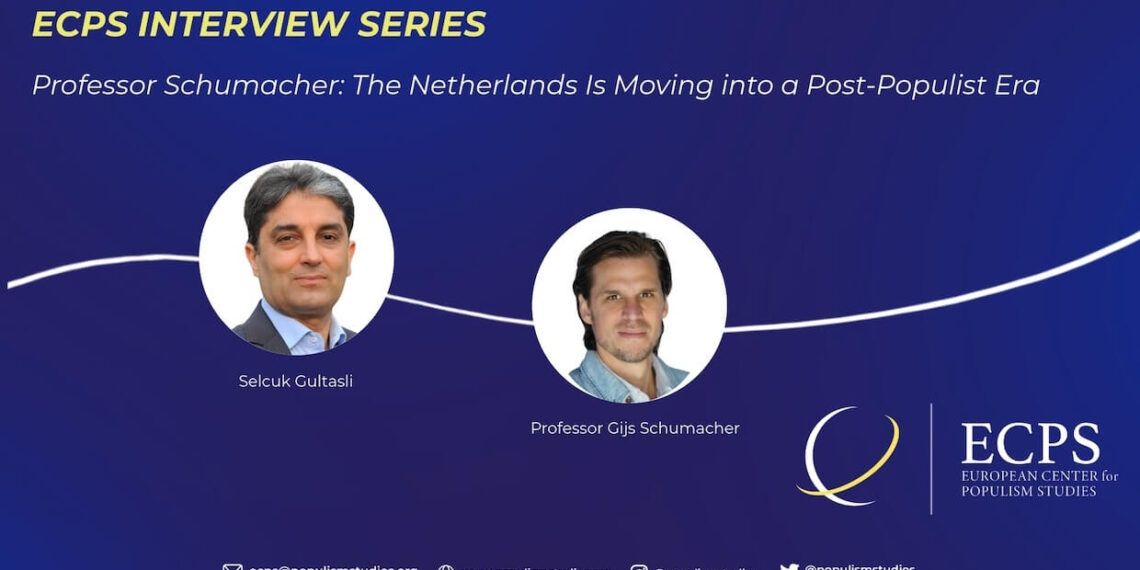In an interview with the ECPS, Professor Gijs Schumacher of the University of Amsterdam argues that Dutch politics may be entering a “post-populist era.” As the Netherlands approaches yet another general election, Professor Schumacher highlights growing fragmentation across left, right, and radical-right blocs, noting that “many voters no longer perceive meaningful differences between centrist parties.” While populism’s anti-establishment appeal remains psychologically powerful, he observes that this sentiment is now spreading “more evenly across the political spectrum.” According to Professor Schumacher, the Netherlands’ long tradition of elite cooperation could allow a shift toward “pragmatic governance,” provided that “the mainstream left and right tone down their toxic rhetoric.” The post-populist phase, he suggests, reflects not decline but recalibration.
Interview by Selcuk Gultasli
As the Netherlands heads toward its third general election in just five years, the country’s political landscape appears more fragmented and volatile than ever. To understand the deeper psychological and structural undercurrents behind this instability, the European Center for Populism Studies (ECPS) spoke with Professor Gijs Schumacher, Professor of Political Psychology in the Department of Political Science at the University of Amsterdam and founding co-director of the Hot Politics Lab. In this wide-ranging conversation, Professor Schumacher reflects on the fragmentation of Dutch politics, the endurance of populist discourse, and what he calls the emergence of a “post-populist era.”
According to Professor Schumacher, the defining feature of contemporary Dutch politics is fragmentation across three major blocs — the left, the right, and the radical right. Yet despite the proliferation of parties, he notes that “people don’t travel much between blocs … the only real possibility for governments is through the middle.” This narrowing of viable coalitional options, he argues, leaves voters disillusioned and searching for alternatives: “Many voters no longer perceive meaningful differences between these centrist parties … and they often end up supporting either other parties within the same bloc or more radical alternatives.”
Populism, Professor Schumacher emphasizes, remains central to understanding this dynamic — particularly its anti-establishment appeal. He observes that this instinct is deeply rooted in human psychology: “It’s a powerful psychological tendency to be skeptical of leadership — to doubt whether those in power are there for your good or their own fortune.” However, Professor Schumacher points out that the Dutch left has largely abandoned its own anti-establishment roots, creating a political vacuum that figures like Geert Wilders have exploited: “Historically, the left had a strong anti-establishment agenda … but in opposing the populist radical right, they’ve completely muted that stance.”
Despite this, Professor Schumacher does not foresee a permanent populist capture of Dutch democracy. Instead, he suggests the country may be entering what he calls a “post-populist era” — a phase in which anti-establishment politics no longer belongs exclusively to the radical right but becomes “more evenly distributed across the political spectrum.” In his words: “The Netherlands has a long history of deep affective polarization — even though we didn’t use that term at the time — but it was never a major problem because, at the elite level, there was greater cooperation. The mainstream left and right don’t need to fight each other; there’s little to gain from it. If their rhetoric were less toxic, there would be no real barrier to a return to pragmatic governance.”
For Professor Schumacher, this shift signals neither a triumph of populism nor its total eclipse but rather a recalibration — a search for equilibrium in a political system that remains both fragmented and remarkably resilient.


